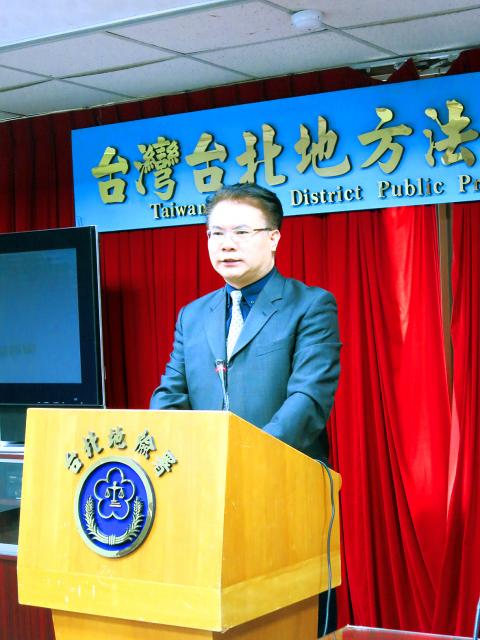The Taipei District Prosecutors’ Office yesterday reviewed data from the Ministry of Justice’s Bureau of Investigation (MJIB) concerning allegations that former Mainland Affairs Council (MAC) deputy minister Chang Hsien-yao (張顯耀) has been acting as a spy. The prosecutors agreed to take charge of an investigation of the matter, despite the same data being turned down by the Taiwan High Prosecutors’ Office on Thursday.
Taipei District Prosecutors started investigations into the case yesterday.
According to sources, Chang has been barred from leaving the country and prosecutors will subpoena him for questioning soon.

Photo: Chen Wei-tzum Taipei Times
The difference between the High Prosecutors’ Office prosecuting the case and the District Prosecutors’ Office prosecuting the case is criminal activity related to national security offenses if taken by the former, and meaning the alleged offense would exclude national security offenses if taken by the latter.
Chang has recently been in the spotlight over allegations that he had leaked sensitive information to Chinese officials.
According to sources, Chang had allegedly leaked five pieces of information on cross-strait economics and trade, as well as on the cross-strait trade services agreement.
The Mainland Affairs Council alleged that Chang divulged “confidential” and “secret” information.
Under the National Security Information Protection Act (國家安全機密保護法), restricted information is given three designations: top secret, secret and confidential.
The source also said Chang was suspected of having leaked information about Executive Yuan meetings, which may give a court cause to call Premier Jiang Yi-huah (江宜樺) to testify.
The prosecutors’ office said it suspected Chang had leaked the information by telling his alleged Chinese contact personally or by passing the contact notes, allowing the Chinese government to learn what Taiwan had brought to the negotiation table and where it would falter.
The bureau’s information showed Chang is suspected of conducting treasonous actions, which would usually place his alleged actions under the jurisdiction of the High Prosecutors’ Office, the District Prosecutors’ Office said.
However, it added that the High Prosecutors’ Office had declined to head the investigation, citing a lack of evidence that the information Chang allegedly leaked was affiliated with national security.
The High Prosecutors’ Office also said that if Chang is charged with dereliction of duty concerning foreign affairs, such charges are only applicable to foreign governments, while the government does not consider relations across the Taiwan Strait to be between nations, based on its “one China” policy.
Separately, lawyer Lin Chun-feng (林俊峰) said that the reason offenses infringing on external security of the nation were placed under the jurisdiction of the High Prosecutors’ Office was that national security matters merited immediate legal attention.
The High Prosecutors’ Office oversees all second trials, which means that once it headed the investigation and oversaw the indictment, the case would go straight through the second and third trials, Lin said.
The nation may have crumbled to the ground by the time the arduous legal processes from initial trial to the third trial are finished with, Lin said.
Additional reporting by CNA

SECURITY: As China is ‘reshaping’ Hong Kong’s population, Taiwan must raise the eligibility threshold for applications from Hong Kongers, Chiu Chui-cheng said When Hong Kong and Macau citizens apply for residency in Taiwan, it would be under a new category that includes a “national security observation period,” Mainland Affairs Council (MAC) Minister Chiu Chui-cheng (邱垂正) said yesterday. President William Lai (賴清德) on March 13 announced 17 strategies to counter China’s aggression toward Taiwan, including incorporating national security considerations into the review process for residency applications from Hong Kong and Macau citizens. The situation in Hong Kong is constantly changing, Chiu said to media yesterday on the sidelines of the Taipei Technology Run hosted by the Taipei Neihu Technology Park Development Association. With

CARROT AND STICK: While unrelenting in its military threats, China attracted nearly 40,000 Taiwanese to over 400 business events last year Nearly 40,000 Taiwanese last year joined industry events in China, such as conferences and trade fairs, supported by the Chinese government, a study showed yesterday, as Beijing ramps up a charm offensive toward Taipei alongside military pressure. China has long taken a carrot-and-stick approach to Taiwan, threatening it with the prospect of military action while reaching out to those it believes are amenable to Beijing’s point of view. Taiwanese security officials are wary of what they see as Beijing’s influence campaigns to sway public opinion after Taipei and Beijing gradually resumed travel links halted by the COVID-19 pandemic, but the scale of

A US Marine Corps regiment equipped with Naval Strike Missiles (NSM) is set to participate in the upcoming Balikatan 25 exercise in the Luzon Strait, marking the system’s first-ever deployment in the Philippines. US and Philippine officials have separately confirmed that the Navy Marine Expeditionary Ship Interdiction System (NMESIS) — the mobile launch platform for the Naval Strike Missile — would take part in the joint exercise. The missiles are being deployed to “a strategic first island chain chokepoint” in the waters between Taiwan proper and the Philippines, US-based Naval News reported. “The Luzon Strait and Bashi Channel represent a critical access

Pope Francis is be laid to rest on Saturday after lying in state for three days in St Peter’s Basilica, where the faithful are expected to flock to pay their respects to history’s first Latin American pontiff. The cardinals met yesterday in the Vatican’s synod hall to chart the next steps before a conclave begins to choose Francis’ successor, as condolences poured in from around the world. According to current norms, the conclave must begin between May 5 and 10. The cardinals set the funeral for Saturday at 10am in St Peter’s Square, to be celebrated by the dean of the College